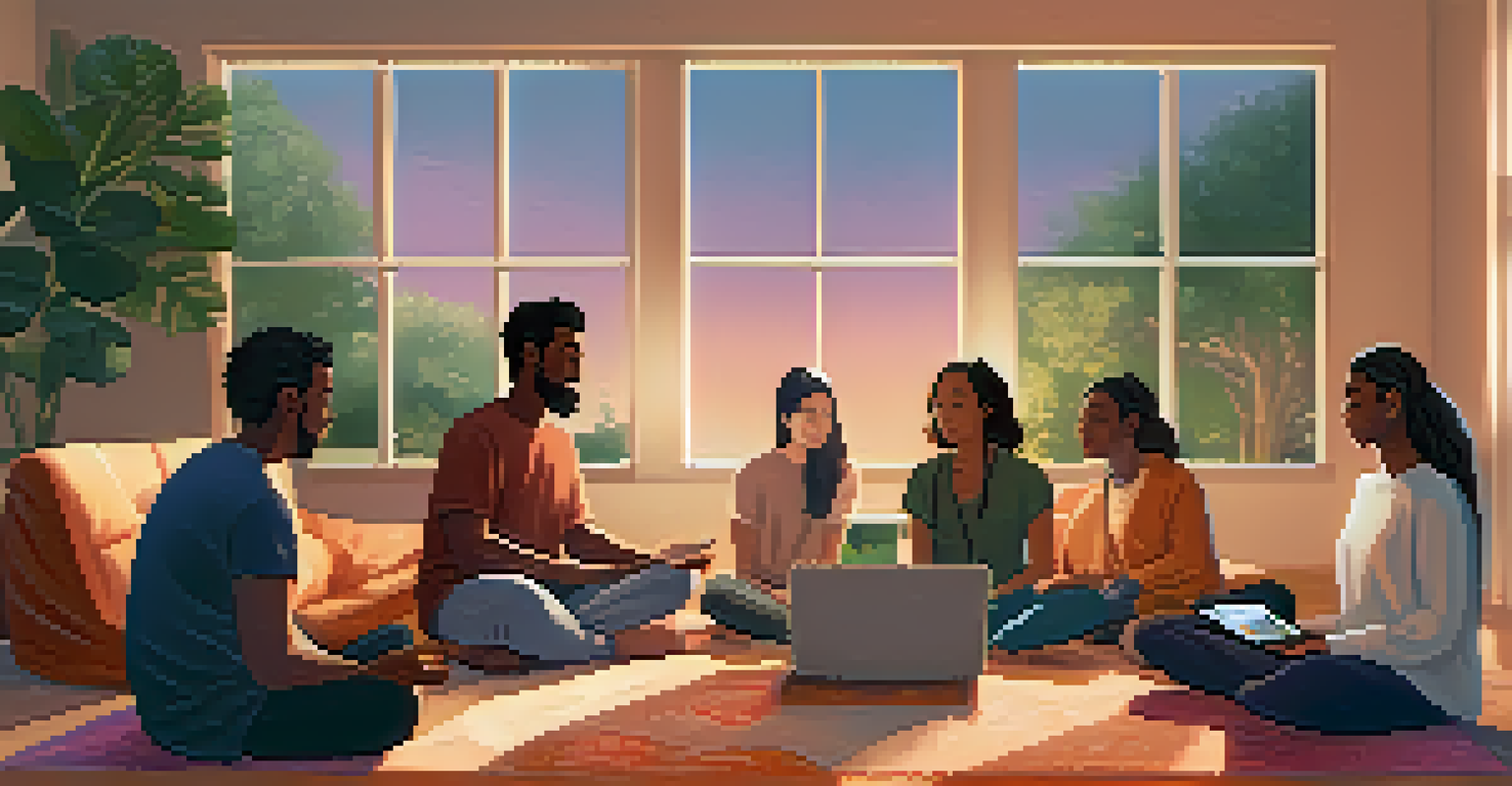The Rise of Online Meditation: Finding Peace in a Digital World

Understanding the Shift to Online Meditation Practices
In recent years, meditation has transitioned from traditional practices to a more accessible online format. This shift allows individuals to integrate mindfulness into their busy lifestyles, reflecting a growing awareness of mental health. With the rise of apps and virtual classes, meditation is no longer confined to studios or retreats, making it easier for anyone to find their calm amidst chaos.
The mind is everything. What you think you become.
The allure of online meditation lies in its convenience; you can practice anywhere, whether it's your living room or a quiet park. Moreover, the diverse range of options available caters to different preferences, from guided sessions to silent retreats. This variety not only attracts beginners but also helps seasoned practitioners deepen their practice without the constraints of location.
With technology at our fingertips, we can access world-renowned teachers and unique meditation styles that may not be available locally. This global reach fosters a sense of community, as people connect with others who share similar goals. Ultimately, the rise of online meditation reflects our evolving relationship with technology and the quest for inner peace.
The Benefits of Digital Meditation Platforms
Digital meditation platforms offer numerous benefits that can enhance your practice. For starters, they provide flexibility in scheduling; you can meditate whenever it suits you, whether it’s early morning or late at night. This adaptability makes it easier for people with hectic schedules to incorporate mindfulness into their daily routines.

Additionally, online platforms often feature a variety of guided meditations, catering to different needs, such as stress relief, focus, or sleep improvement. This targeted approach allows users to select sessions that resonate with their personal goals. The ability to personalize your meditation experience increases motivation and encourages consistency.
Online Meditation's Growing Popularity
The shift to online meditation makes mindfulness more accessible, allowing individuals to practice anywhere and at any time.
Moreover, many online platforms foster a sense of community through virtual groups or forums where users can share experiences and challenges. This connection can be incredibly motivating, as it reminds us that we’re not alone on our mindfulness journey. In essence, digital meditation platforms not only provide tools for individual practice but also cultivate a supportive environment for collective growth.
Challenges of Practicing Meditation Online
While online meditation has many benefits, it’s not without its challenges. One common issue is the potential for distraction; when meditating at home, it’s easy to get sidetracked by everyday tasks or digital notifications. Creating a dedicated space for practice can help mitigate these distractions, allowing you to focus more effectively.
Meditation is not a means to an end. It is both the means and the end.
Another challenge is the lack of in-person guidance that a traditional class offers. Some individuals may find it difficult to stay accountable without a teacher physically present. To counter this, many platforms incorporate live classes or check-in features, adding a layer of support that can enhance your commitment to practice.
Lastly, the overwhelming number of options can lead to decision fatigue. With so many guided meditations and styles available, it can be hard to know where to start. Setting clear intentions for your practice can simplify this process, helping you choose what aligns best with your current needs and goals.
Incorporating Mindfulness into Daily Life
Meditation is a powerful tool, but its true value comes from incorporating mindfulness into everyday life. This means applying the principles of meditation—such as awareness and presence—to daily activities. For instance, practicing mindful eating allows you to savor your meals and cultivate a deeper appreciation for nutrition.
Another way to integrate mindfulness is through conscious breathing. Taking a few moments throughout your day to focus on your breath can help reduce stress and ground you in the present. Whether you're in a meeting or waiting in line, these small practices can create a significant impact on your overall well-being.
Benefits of Digital Meditation Tools
Digital platforms enhance meditation practices by offering flexibility, personalized sessions, and community support.
Moreover, sharing your experiences with friends or family can foster a culture of mindfulness in your community. Engaging in discussions about your meditation practice and its benefits can inspire others to explore it themselves. In this way, mindfulness becomes a shared journey, creating a ripple effect that enhances collective peace.
The Role of Technology in Enhancing Meditation
Technology plays a pivotal role in enhancing the meditation experience, offering innovative tools that can deepen your practice. For instance, wearable devices can track your heart rate and stress levels, helping you understand how meditation impacts your body. This feedback encourages mindfulness and can motivate you to stay consistent.
Additionally, virtual reality (VR) meditation experiences are gaining popularity, transporting users to serene environments that enhance relaxation. These immersive experiences can help individuals connect with their practice on a deeper level, making it feel more engaging and effective. The blend of technology and meditation creates a unique opportunity for exploration and growth.
Furthermore, meditation apps often include features like progress tracking and reminders, which can help users stay committed to their journey. By using these tools, individuals can visualize their growth over time, making the practice feel more rewarding. Ultimately, technology, when used mindfully, can be a powerful ally in your quest for peace.
The Global Impact of Online Meditation Communities
Online meditation communities have emerged as a powerful force in promoting mindfulness across the globe. These platforms connect individuals from diverse backgrounds, encouraging the exchange of ideas and experiences. This cultural sharing enriches personal practice and fosters a sense of unity among participants.
Moreover, many communities host virtual events, such as group meditations or workshops, creating opportunities for collective practice. These gatherings can enhance motivation and provide a shared sense of purpose, making the meditation experience feel more communal. It's a beautiful reminder that we are all in this journey together.
Future of Meditation in a Digital Age
The future of online meditation promises innovative technologies and greater accessibility, empowering people to prioritize their mental well-being.
As these online communities grow, they also contribute to a broader conversation about mental health and wellness. By normalizing discussions around mindfulness, they help reduce the stigma associated with seeking help. This collective effort is instrumental in promoting a culture of well-being and acceptance in our increasingly hectic world.
Looking Ahead: The Future of Online Meditation
As we look to the future, the trend of online meditation shows no signs of slowing down. With advancements in technology, we can expect even more innovative solutions that cater to the evolving needs of practitioners. From AI-driven personalized meditation sessions to enhanced community features, the possibilities are vast.
Additionally, as the importance of mental health continues to gain recognition, online meditation will likely play a crucial role in making mindfulness accessible to all. This democratization of meditation can empower individuals from all walks of life to prioritize their mental well-being, breaking down barriers that may have previously existed.

Ultimately, the future of online meditation is bright, and it represents a significant shift in how we approach wellness in a digital age. As we embrace these changes, we open ourselves up to new opportunities for growth, connection, and peace. In this ever-changing landscape, finding our center amidst the noise of the digital world becomes more vital than ever.